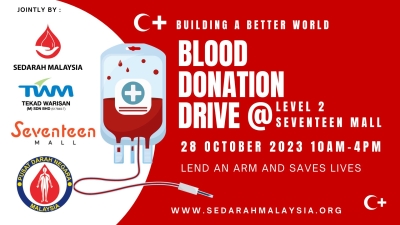Blood Center
List of Blood Banks of the State Hospitals in Malaysia
| Pusat Darah Negara, Jalan Tun Razak, 50400 Kuala Lumpur | 03-2695 5557 / 58 | 03-2698 0328 |
| Unit Transfusi Perubatan, Hospital Sultanah Aminah, 80100 Johor Bharu, Johor. | 07-356 5034 | 07-356 5088 |
| Unit Transfusi Perubatan, Hospital Tuanku Jaafar, Jalan Rasah, 70300 Seremban, Negeri Sembilan. | 06-762 3333 | 06-763 2900 |
| Unit Transfusi Perubatan Hospital Melaka, Jalan Mufti Hj.Khalil, 75499 Melaka. | 06-282 2344 | 06-284 1490 |
| Unit Transfusi Perubatan Hospital Tengku Ampuan Rahimah, 41200 Klang, Selangor. | 03-3375 7000 | 03-3373 8139 |
| Unit Transfusi Perubatan Hospital Raja Permaisuri Bainun, 30450 Ipoh, Perak. | 05-253 3333 | 05-242 3790 |
| Unit Transfusi Perubatan Hospital Sultanah Bahiyah, 05100 Alor Star, Kedah. | 04-7406265 | 04-7406266 |
| Unit Transfusi Perubatan, Hospital Pulau Pinang, Jalan Residensi, 10450 Pulau Pinang. | 04-200 2161 | 04-200 2155 |
| Unit Transfusi Perubatan Hospital Tuanku Fauziah, 01000 Kangar, Perlis. | 04-976 3333 | 04-976 7237 |
| Unit Transfusi Perubatan, Hospital Raja Perempuan Zainab II, Jalan Hospital, 15000 Kota Bharu, Kelantan. | 09-790 9333 | 09-790 0996 |
| Unit Transfusi Perubatan, Hospital Sultanah Nur Zahirah, 20400 Kuala Terengganu, Terengganu. | 09-621 2121 | 09-631 3409 |
| Unit Transfusi Perubatan Hospital Tengku Ampuan Afzan, 25100 Kuantan, Pahang. | 09-557 2085 | 09-513 7206 |
| Unit Transfusi Perubatan, Hospital Umum Sarawak, Jalan Tun Ahmad Zaidi Adruse, 93586 Kuching, Sarawak. | 082-276 666 | 082-243 454 |
| Unit Transfusi Perubatan, Hospital Queen Elizabeth, 88586 Kota Kinabalu, Sabah. | 088-206 385 |
088-257 256 |
BLOOD DONATION…if you have donated blood, even once, you are a special person and your contribution is priceless!! To donate blood, the donor is driven by various factors such as altruism, the feeling of wanting to help patients in need that may include friends and relative, or even after being persuaded by friends and relatives. As we are all aware blood is an important part of medical treatment. With the advances in medical technology and the increase in the number of hospitals nationwide, the demand for blood and blood products also increases. Medical and surgical treatments such as cardiac surgery and organ transplantation, and management of thalassemia, haemophilia and patients with anaemia, all depend on blood transfusion. Ministry of Health Malaysia has targeted to recruit at least 5% of Malaysian population to become blood donors. Though the target is yet to be achieved, the total number of donation has been showing a steady increase over the years. For example, the National Statistic of Blood Collection showed that a total number of 507, 461 units of blood were donated in 2007, compared to 477, 365 units in 2006. All the efforts and objective in supplying enough blood for patients will not succeed without the help and support by the general public. Awareness among the public is important should we want to make blood donation a public responsibility and part of our life and culture.
Type of donation
Blood can be donated by two means ? whole blood donation and apheresis donation.
Whole Blood Donation
This type of donation is the commoner among the two. The donated blood will then be processed in the laboratory into its individual components namely Plasma, Platelet Concentrates and Packed Red Cells.
|
|
|
|
Volume of whole blood collected depends on the donor’s body weight. Maximum of 450 ml of whole blood is collected from a donor who weighs more than 50 kg. For those with body weight between 45 ? 50 kg, the amount of whole blood collected is 350 ml. The whole donation process would take approximately 30 minutes to complete and a whole blood donor may donate as frequent as every three months.
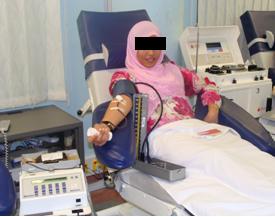
Donating whole blood
Apheresis Donation
Apheresis donation is donating either plasma or platelets or both, using a plasma or platelet separator machine, also known as an apheresis machine. Time taken to complete an apheresis donation is between 30 to 45 minutes for plasmapheresis dan between 45 to 75 minutes for plateletpheresis. Since the red cells are not collected in apheresis donation, a donor may donate more frequently, which is every two weeks, compared to the whole blood donation.
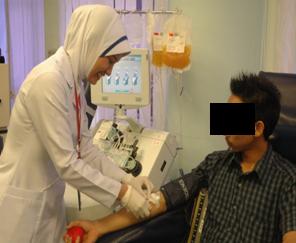
Apheresis donation
Qualification Criteria for Whole Blood and Apheresis Donor
Before a person is allowed to donate his or her blood, he or she needs to fulfil few basic criteria as listed below: Whole Blood Donor
- Aged between 18 and 60 years old (for those less than 18, written consent from parents or legal guardian is required)
- Body weight of at least 45 kg.
- In good physical and mental health with no chronic medical illness.
- Not on long term medications and has not been intoxicated by alcohol within 24 hours prior to donation.
- Should not be fasting and have had enough sleep (more than 5 hours) the night before donating.
- Has been staying in Malaysia for at least 1 year (for non-citizen).
For apheresis donors, aside from the criteria above, there are few additional criteria they have to fulfil:
- Aged not more than 55 years old
- Body weight of more than 55 kg.
- Have donated whole blood at least twice before and the last donation was not more than 6 months ago.
- Having a suitable venous access (firm, large and palpable vein)
A person suitability to donate will be determined by the Medical Officer or the nurse on duty. A potential donor has to be in a good state of health so that the donation itself would not bring harm to the donor and also the donated blood would not harm the patient who would be transfused with the blood. Strict donor selection procedure practices by the Blood Banks are there to guarantee the quality of the donated blood. Besides needing to be physically healthy, individuals that are found to be involved in high risk behaviours are NOT ALLOWED at all to donate their blood. These high risk behaviours include sharing needles among drug users, being involved in prostitution or visit prostitutes, having sexual relationship with the same gender and having or had more than one sexual partner. Blood donation has to be made with full responsibility and intention of helping the patient in need. Thus, all potential donors must be honest when answering questions during the pre-donation counselling session. Refusal to do so would only increases the risk to the patient who may end up receiving infected blood. Click to read more about Blood Donation Deferral.
Blood Donation Process
- Donor will first need to fill up the blood donation registration form/card.
- Have their body weighed.
- Have a blood test to identify the blood group and haemoglobin level.
- Undergoes pre-donation counselling by Medical Officer / Nurse.
- If qualified, have their details registered and blood donation book issued.
- This is followed by the blood donating process itself that would normally last between 7 ? 15 minutes.
- After the donation completed and needle removed, the donor needs to rest for at least 10 minutes before getting off the bed.
- Donor will then be served with light refreshment.
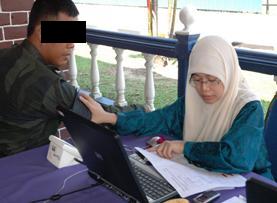 Blood test before donating
Blood test before donating
Advise to Donors After Donating
- After donating, donors are advised to rest on the donor bed for at least 10 minutes. Only then, can they get off the bed if there is no complication such as feeling of nausea, dizziness or pallor.
- Donors are encouraged to have some drinks and snacks prepared after their donation.
- Donors are advised to drink plenty of fluid within the next 12 hours after their donation. This is to replace the fluid is loss during the donation.
- Do not take alcoholic drink for the first few hours after donating.
- Avoid strenuous physical activities such as skydiving, deep sea diving, swimming, mountain climbing or any contact sports within the first 24 hours after donating.
Blood Donation Centres
Blood donation service is available at the National Blood Centre, Kuala Lumpur and at the blood bank of selected government hospitals. These donation centres are open for blood donation every working days during office hour (please call the nearest donation centre for further details).
Mobile Blood Donation Session
Aside blood donation at the blood banks, mobile blood donation programs are also conducted actively to make it easier for the general public to come forward to donate their blood. These mobile sessions are conducted at the government as well as private offices and buildings, factories, institutes of higher learning as well as shopping centres. Such program is organised with the help and support of the non-government organisations (NGOs), student bodies as well the government and private associations. For those that have any questions or are looking for further information on blood donation or when and where to donate their blood, please call the National Blood Centre or the blood bank of their nearest hospitals.
Donating blood at a mobile session
Source: myhealth.gov.my
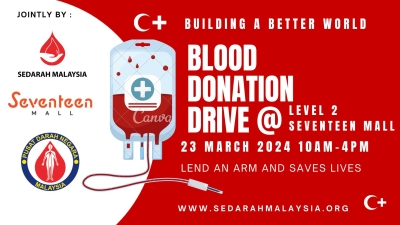
.jpg)
